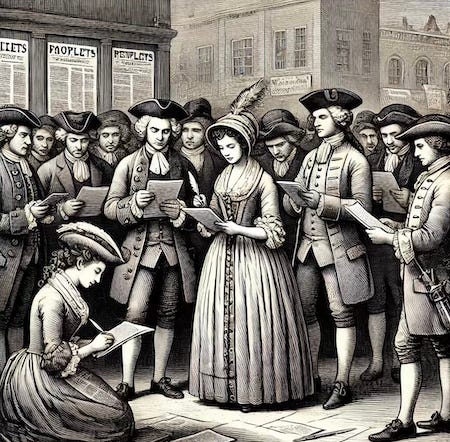There was a time—not so long ago—when you could flip open a newspaper and expect a reasonably faithful account of the truth. Sure, every newsroom had its slant, its shorthand, its blind spots. But facts? Those still mattered. Editors demanded them. Reporters chased them. And if they got it wrong, they printed a correction.
That time, my friends, is gone.
Legacy media—the big, glossy, corporate-owned beasts—traded in their credibility for clicks and campaign cash. They didn’t fall from grace. They sold it off. Piece by piece. Truth was just the first casualty. Once-local newspapers were devoured by hedge funds and mega-corps, gutted of their investigative muscle, and repackaged into bland, predictable mouthpieces. Today, just five corporate giants control nearly all the media Americans consume. Five. For a country built on a free press, that should raise more than a few eyebrows.1
But here’s the thing about truth—it doesn’t stay buried for long.
Across this country, from bucolic farm towns to crowded city blocks, citizen journalists are rising up like mushrooms after the rain. Armed with smartphones, Substacks, podcasts, and a damn good reason, they’re asking the hard questions legacy media won’t touch. They’re showing up to school board meetings, FOIA’ing documents, live-streaming protests, fact-checking in real time. They’re the modern-day pamphleteers. They’re what’s next.
And if that sounds familiar, it’s because we’ve been here before.
In the early days of this republic, newspapers weren’t polished or polite. They were fiery, flawed, and fearless. They were written by farmers, ministers, printers, and poets. Abigail Adams2 and Frederick Douglass,3 Thomas Paine4 and Ida B. Wells.5 These folks weren’t waiting for permission to publish. They had something to say, and the guts to say it loud. They printed the truth as they saw it, passed it hand to hand, and in doing so, lit the fire of democracy.
We are living in another one of those moments.
A new media frontier is taking shape—not in skyscrapers or shiny studios, but in kitchens, garages, and coffee shops. On TikTok and Telegram. On Substack and Mastodon. It’s messy. It’s imperfect. But it’s ours.
The old press may have lost its way, but the American people haven’t. We are reclaiming the narrative. Not with corporate sponsors or billion-dollar mergers, but with our voices. Our curiosity. Our refusal to shut up.
This is what democracy sounds like now.
So pick up your “pen.”
Maybe it’s a camera. Maybe it’s your keyboard, your mic, or just your phone in your hand. Doesn’t matter. What matters is this: you don’t need a press badge, a PhD, or a Pulitzer to have something worth saying. If you care about this country, if you see something that needs fixing—or something that gives you hope—say it. Say it loud. Say it in public. Say it where others can hear and join in.
Because truth doesn’t belong to the powerful. It belongs to us. And we’ve got stories to tell.
Stay strong. Stay bold. Stay American!
Lady Libertie
Join the Resistance. Share this Post. Prepare Now.
Liked this? There’s more waiting in the Pamphleteer Library—a growing archive of downloadable books, guides, and handouts for your local resistance. Paid subscribers get everything for free. Explore the Library →
As of the most recent data, about 90% of the media Americans consume is controlled by just five major conglomerates:
Comcast (owns NBCUniversal)
The Walt Disney Company (owns ABC, ESPN, Hulu, etc.)
Paramount Global (formerly ViacomCBS, owns CBS, MTV, Comedy Central, etc.)
Warner Bros. Discovery (owns CNN, HBO, and more)
Fox Corporation (owns Fox News and Fox Broadcasting)
Abigail Adams didn’t write books—but her letters were revolutionary. Most famous: her 1776 letter to John Adams urging him to “remember the ladies” as he helped draft the laws of the new nation. She wrote passionately about women’s rights, slavery, education, and political participation—all from her kitchen table in Quincy, Massachusetts. Her correspondence is some of the most candid, intellectually rich writing from the founding era. “If particular care and attention is not paid to the Ladies, we are determined to foment a Rebellion…”
Frederick Douglass, a formerly enslaved man who became one of the most powerful voices for abolition and civil rights in American history. “The limits of tyrants are prescribed by the endurance of those whom they oppress.” Key works:
“Narrative of the Life of Frederick Douglass, an American Slave” (1845) – a firsthand account of slavery’s brutality and his journey to freedom.
“What to the Slave Is the Fourth of July?” (1852) – a searing speech that shredded the hypocrisy of American freedom under slavery.
He also founded and edited the North Star, an abolitionist newspaper.
Thomas Paine wrote the pamphlet that lit the match for American independence. “We have it in our power to begin the world over again.”
“Common Sense” (1776) – a wildly popular call to break free from British rule, written in plain language so that every working person could understand.
Also wrote “The Crisis” (think: “These are the times that try men’s souls…”)—a rallying cry during the darkest hours of the Revolution.
Ida B. Wells, journalist, editor, and civil rights crusader who documented and exposed lynching in the United States with unsparing detail. “The way to right wrongs is to turn the light of truth upon them.” Key works:
“Southern Horrors: Lynch Law in All Its Phases” (1892)
“The Red Record” (1895)
She used investigative reporting to destroy the lie that lynchings were about justice. They were about racial terror and control—and she named names, dates, places. No one had done that before.






Hey my lovely readers, I somehow flubbed the permissions on this post, and for most of the morning only paid subscribers could comment. This is a no-paywall publication. Everyone is welcome to comment. Please forgive my mistake and do let me know if that ever happens again.
Us being the mushrooms that spring forth after the rain, MUST take care to nourish and form the mycellium that allows this phenomenon to occur 🍄